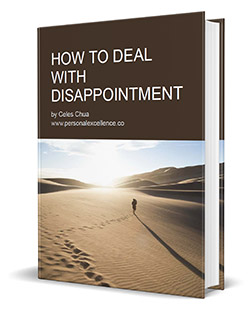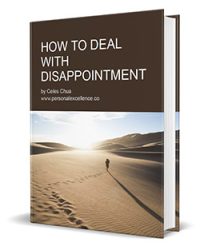
This is part 1 of a 4-part series on how to deal with disappointment.
- Part 1: 3 Reasons Why Disappointment Is Good
- Part 2: Are You Letting Your Disappointments Destroy You?
- Part 3: How to Deal With Disappointment
- Part 4: My Experience with Disappointment and How I Overcame It

“One’s best success comes after their greatest disappointments.” — Henry Ward Beecher
Have you ever felt disappointed about something?
It could be any event in your life. Perhaps you were passed up for a job promotion. Maybe you lost a business deal. Maybe someone you like did not return your feelings. Maybe your relationship did not work out. Maybe a friend betrayed you. Maybe you suffered a business failure.
How did it feel? Did you feel numb? Did you feel dejected? For the really bad cases, did you feel like it was the end of the world?
Disappointment is a feeling of sadness when something falls short of your expectation. Every day, people deal with disappointment. Depending on how big the disappointment is and how you deal with it, this feeling may disappear after a short while, or hang over your life for a long period of time. If not dealt with properly, disappointments can lead to depression, and eventually apathy.
Why Disappointments Are Good
Contrary to what some may think, disappointment is a good thing, for 3 main reasons.
1. Disappointment means passion for something
Every cause has an effect. Think of disappointment as an effect, where the cause is your love for the thing in question.
For example,
- You are disappointed in a friend, because you care a lot about the friendship.
- You are disappointed in your recent dates, because you are passionate about finding the one for you.
- You are disappointed in your business failure, because you really want to see it succeed. Because you care deeply about the mission of your work.
As the saying goes, “There can be no deep disappointment where there is not deep love” (Martin Luther King Jr.). This deep love is what drives you towards your goals.
Know that disappointment is a better emotional state than apathy. When someone is apathetic, they feel indifferent about everything. This is no different from being a robot. But here, you recognize your emotions and you feel them — be it good or bad. This is a good thing, because to feel is to be in touch with your inner self.
2. Disappointment means an opportunity for growth
Every time we feel disappointed, it means there is an error in our framework of reality.
Why do I say that? Let’s start with why you feel disappointed. You feel disappointed because you had an expectation and it was not met. Hence, you feel disappointment.
It could be from not winning a competition that you trained heavily in. Or investing in a friendship, where the friend did not reciprocate your effort. Or putting yourself on the line for your job, but getting laid off as your boss did not appreciate you. Each time, you had an expectation that was not met, and when confronted with the truth, you became disappointed.
Here, your disappointment comes from the mismatch between reality and your expectation. Yet, the reality has been this way all along — reality did not change in that one second leading to your discovery of the truth. The world did not conspire to bring you down. The reason you feel disappointed is because you discovered the truth — and this truth is not what you thought it would be.
So, think of your disappointment as a troubleshooting tool to understand the gaps in your mental framework of reality. By using disappointment to understand more about the world and correct your assumptions, you become more knowledgeable and wiser. You can also correct your actions to better achieve your goals.
3. Disappointment makes you stronger
Last but not least, this may seem cliche, but disappointment makes you stronger. When you go through a harsh emotion like that, you become tougher. You learn to process and work through your emotions. You become more resilient to life’s hardships.
In the next part, we examine 3 destructive approaches that people use when faced with disappointments, and why you should not adopt them. Read Part 2: Are You Letting Your Disappointments Destroy You?
This is part 1 of a 4-part series on how to deal with disappointment.










 Thanks for reading. If you like my free articles, join my private email list and get my latest updates and articles sent right to your inbox.
Thanks for reading. If you like my free articles, join my private email list and get my latest updates and articles sent right to your inbox.